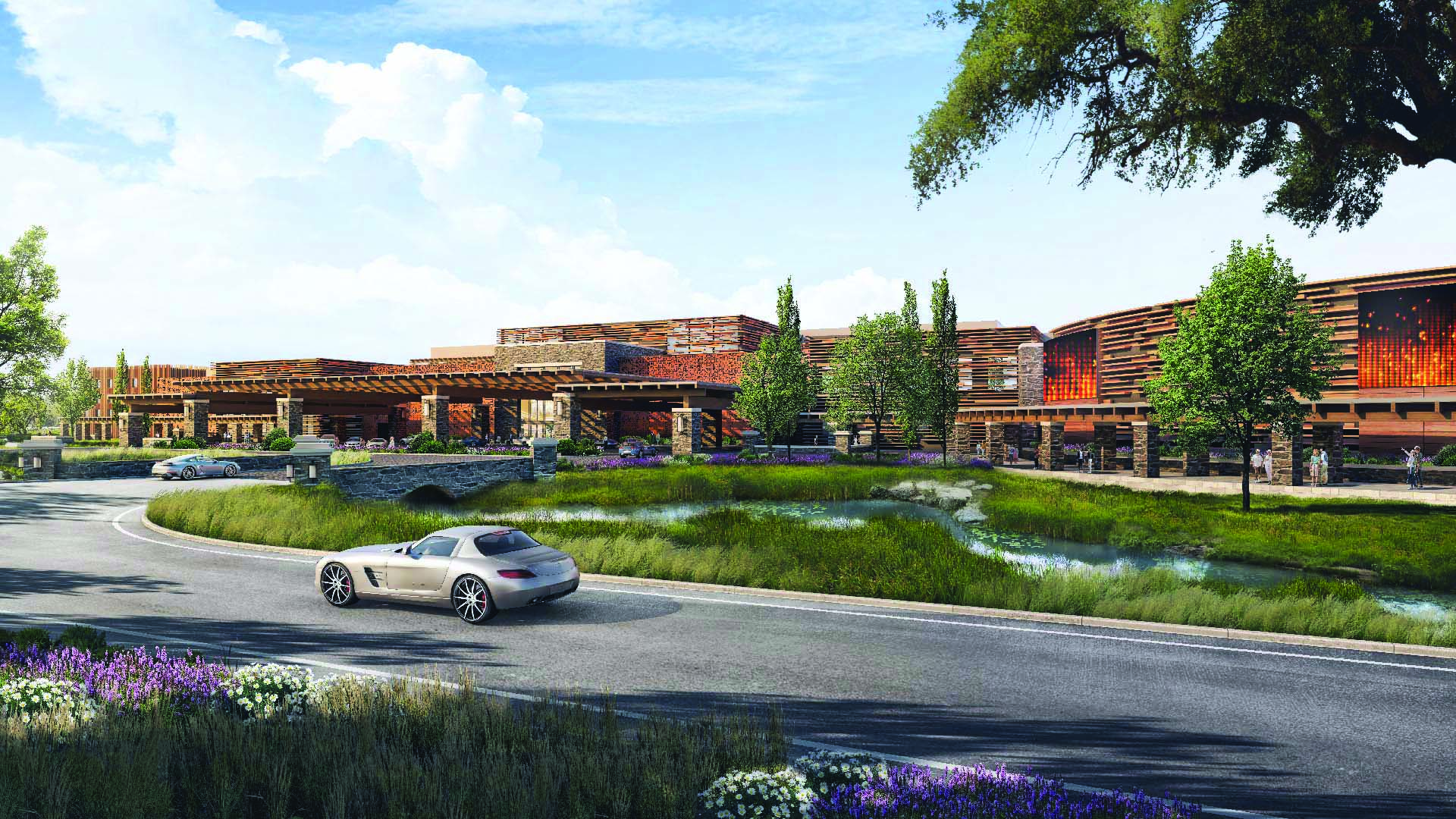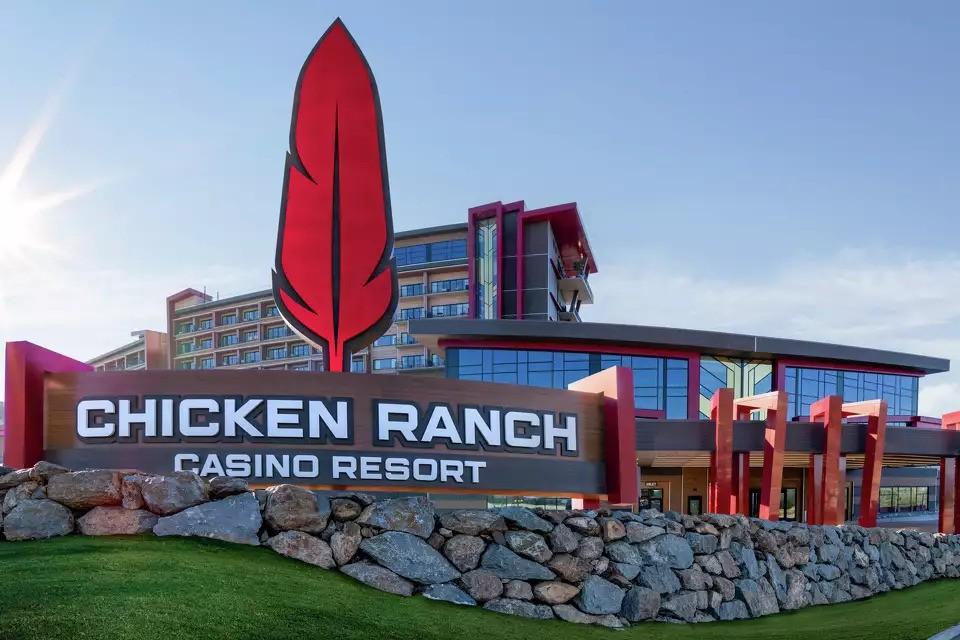:quality(70)/cloudfront-us-east-1.images.arcpublishing.com/adn/NETXFJE7LBAA3LJOEYGSGBUHNU.JPG)
A new gambling venture started in Anchorage on Monday, in spite of an ongoing lawsuit opposing it. The Native Village of Eklutna opened several electronic gaming machines inside a temporary modular building put up near the Birchwood Airport at the northern end of the municipality.
“This represents a historic milestone in the journey toward true self-determination for the Native Village of Eklutna,” Aaron Leggett, president of the Native Village of Eklutna, said in a statement Monday evening about what the tribe is calling the Chin’an Gaming Hall. “Chin’an means ‘thank you’ in Dena’ina/Athabascan.”
For the time being, just eight people can play the machines at any one time, and they must be invited, according to the tribe’s statement. The building is not open to the public, and the hours are limited, though that will change as the operation prepares for a soft opening, according to the tribe’s statement. On Sunday, a Daily News journalist was told by a security guard to leave the property.
Gov. Mike Dunleavy’s administration in December asked the Trump administration to overturn a ruling that allowed the gaming hall to move forward.
Asked whether this week’s change in presidential administrations played a role in the rapid timeline and limited opening on a long-running project in a portable trailer, Leggett said in a written statement, “we had an opportunity, and we moved forward quickly,” he wrote. “The Native Village of Eklutna has waited decades for this opportunity. Tribal members have been told by their parents and grandparents about this. Some were in tears at the opening. This is about providing for the Eklutna people and helping grow the local economy.”
It’s a major development in a contentious saga stretching back decades over whether tribes in Alaska can operate certain gambling operations. Many such operations are illegal under Alaska law, though there are many exemptions for regulated wagering activities like bingo, raffles and pull-tabs.
Last year, Eklutna’s efforts got a major boost when several federal entities agreed with its arguments that the tribe should be allowed to open a gambling operation on a parcel of land a few miles from its headquarters, a Native allotment in the possession of tribal members since the early 1960s.
:quality(70)/cloudfront-us-east-1.images.arcpublishing.com/adn/EMIDFGTFT5EYZJKCH6UZN72OMI.jpg)
Since then, the project has sped along quickly. A formal environmental assessment prepared by the Bureau of Indian Affairs was released in December. Public comment on the document was taken through Jan. 9.
And by Monday, just as the changeover in presidential administrations was underway, the makeshift facility opened for business.
“Our Tribe has struggled for many years to develop a strong tribal economy that will allow us to take the best care of our people and to be a positive partner to all our neighbors. Our now-opened gaming hall presents an incredible opportunity to reach these goals,” Leggett said in his statement. “It will enable the Tribe to support housing and healthcare initiatives, employment opportunities, job training, scholarships, and cultural enhancement programs in the community.”
Gov. Dunleavy’s administration, in its 27-page document outlining priorities and requests of the new Trump administration, asked the incoming administration to overturn an Interior Department ruling issued last year called the Anderson Opinion, which determined whether Alaska Native tribes have legal jurisdiction on Native allotments — one of the key mechanisms through which the Eklutna project advanced.
“That prior decision held that Eklutna did not have territorial jurisdiction over a Native allotment and therefore did not have ‘Indian lands’ as required by tribal gaming laws,” the Dunleavy administration document stated. “Thus, through the baseless Anderson Opinion, there is a risk that for the first time Alaska will have casino gambling thrust upon it by the federal government.”
In December, Anchorage attorney Don Mitchell filed a lawsuit in federal court on behalf of eight nearby community members aiming to block the development. Mitchell declined to be interviewed, directing inquiries to the case’s main plaintiff, Brian Holl, who did not immediately return an interview request.
Anchorage Mayor Suzanne LaFrance and Assembly Chair Christopher Constant this month said they support the venture.
The site of the project is a parcel near the end of Birchwood Spur Road, hemmed in to the north by the Alaska Railroad and on the east by Peters Creek. To the west, toward the upper reaches of Cook Inlet, is the Birchwood airport and a large shooting range.
:quality(70)/cloudfront-us-east-1.images.arcpublishing.com/adn/QDY2LEMP7FHB3FSO3XFGXD7XEA.JPG)
The tribe said it expects the venture to “generate more than $67 million in new economic activity in the Municipality,” according to its statement. Most of that money will stay with the Native Village of Eklutna and wages paid to employees. The parcel is not obliged to pay municipal taxes on either the property or revenues. According to Leggett, they have struck an “interim intergovernmental agreement” with the city to “help offset the costs of public safety services” in the area, which is covered by the Anchorage Police Department and Chugiak Volunteer Fire and Rescue Company.
The project backers seldom use the word “casino” to describe the venture, instead referring to it as a “gaming hall” in explanatory materials and regulatory applications.
“It would be very modest. It would not be like the casinos operated in Las Vegas, Atlantic City, or even some of the lower 48 tribal casinos,” says a question-and-answer page on the Native Village of Eklutna’s website. “The potential gaming hall would be limited to electronic machines; there would be no card or table games.”
The tribe laid out specific plans for the eventual building in its final environmental assessment, submitted to the Bureau of Indian Affairs and approved earlier this month.
The one-story structure will take up 58,000 square feet, surrounded by parking space. Inside it will be up to a thousand gaming machines, along with “two food and beverage venues” seating around 200 people, according to the assessment. The tribe has not made a decision yet about whether the on-site restaurants will apply for state permits to serve alcohol.
“The gaming facility would be open for up to 24 hours a day, 7 days a week,” according to the assessment, which projects it will employ a staff of 228 people in total.
Construction on the proposed design will take 13 to 15 months, according to the assessment, and won’t open its doors until 2026. No alcohol will be sold in the temporary gaming trailer, the tribe said in the Monday statement.
The 8-acre site was originally a Native allotment belonging to Eklutna tribal member Olga Ondola, and is still owned by her heirs, all of whom are members of the tribe, according to the environmental assessment.
A decision by the Interior Department in June 2024, the so-called Anderson Opinion, “concluded that tribes in Alaska are presumed to have jurisdiction over Native allotments when they are owned by tribal members and are geographically associated with the tribal community,” according to the assessment. That decision, according to Eklutna, made the Ondola parcel eligible for a gambling facility.
“The Ondola Allotment is located five miles from the Tribe’s headquarters and on lands customarily and traditionally used by tribal members. Accordingly, the presumption in favor of tribal jurisdiction over the Ondola Allotment is met because the Ondola Allotment is owned by tribal members and is not geographically removed from the tribal community,” reads a section of a July letter from the National Indian Gaming Commission to Leggett, the tribal president, approving the Eklutna gaming proposal.
• • •




